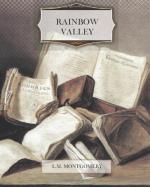Susan would have died of horror on the spot if she had heard Miss Cornelia so admonishing a minister. But Miss Cornelia departed in a warm glow of satisfaction over duty done, and that night Mr. Meredith asked Mary to come into his study with him. Mary obeyed, looking literally ghastly with fright. But she got the surprise of her poor, battered little life. This man, of whom she had stood so terribly in awe, was the kindest, gentlest soul she had ever met. Before she knew what happened Mary found herself pouring all her troubles into his ear and receiving in return such sympathy and tender understanding as it had never occurred to her to imagine. Mary left the study with her face and eyes so softened that Una hardly knew her.
“Your father’s all right, when he does wake up,” she said with a sniff that just escaped being a sob. “It’s a pity he doesn’t wake up oftener. He said I wasn’t to blame for Mrs. Wiley dying, but that I must try to think of her good points and not of her bad ones. I dunno what good points she had, unless it was keeping her house clean and making first-class butter. I know I ’most wore my arms out scrubbing her old kitchen floor with the knots in it. But anything your father says goes with me after this.”
Mary proved a rather dull companion in the following days, however. She confided to Una that the more she thought of going back to the asylum the more she hated it. Una racked her small brains for some way of averting it, but it was Nan Blythe who came to the rescue with a somewhat startling suggestion.
“Mrs. Elliott might take Mary herself. She has a great big house and Mr. Elliott is always wanting her to have help. It would be just a splendid place for Mary. Only she’d have to behave herself.”
“Oh, Nan, do you think Mrs. Elliott would take her?”
“It wouldn’t do any harm if you asked her,” said Nan. At first Una did not think she could. She was so shy that to ask a favour of anybody was agony to her. And she was very much in awe of the bustling, energetic Mrs. Elliott. She liked her very much and always enjoyed a visit to her house; but to go and ask her to adopt Mary Vance seemed such a height of presumption that Una’s timid spirit quailed.
When the Hopetown authorities wrote to Mr. Meredith to send Mary to them without delay Mary cried herself to sleep in the manse attic that night and Una found a desperate courage. The next evening she slipped away from the manse to the harbour road. Far down in Rainbow Valley she heard joyous laughter but her way lay not there. She was terribly pale and terribly in earnest—so much so that she took no notice of the people she met—and old Mrs. Stanley Flagg was quite huffed and said Una Meredith would be as absentminded as her father when she grew up.
Miss Cornelia lived half way between the Glen and Four Winds Point, in a house whose original glaring green hue had mellowed down to an agreeable greenish gray. Marshall Elliott had planted trees about it and set out a rose garden and a spruce hedge. It was quite a different place from what it had been in years agone. The manse children and the Ingleside children liked to go there. It was a beautiful walk down the old harbour road, and there was always a well-filled cooky jar at the end.




